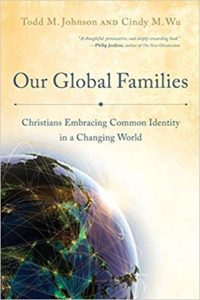
Our Global Families: Christians Embracing Common Identity in a Changing World
Reviewed by Andrew F. Bush, Missiology and Anthropology, Eastern University
Can the global Christian community, divided by its thousands of denominations and regional trends while also challenged by the increased vigor of other religions, be a source of healing to a world wracked by war, poverty, disease, and injustice? This daunting question is the basis for Todd M. Johnson and Cindy M. Wu’s Our Global Families: Christians Embracing Common Identity in a Changing World. The authors indeed argue that the global Christian community can be a part of transforming the world. This will necessitate, however, that all Christian traditions affirm their common identity with two families: the global Christian family and the global human family.
Johnson, Associate Professor of Global Christianity at Gordon Conwell Theological Seminary and co-editor of the Atlas of Global Christianity (Edinburgh University Press, 2009), and Wu, a former graduate student of Johnson’s with a concern for global diversity and unity, develop their thesis by bringing together a wide body of information related to religious demography. Their goal is to give Christians a perspective of their membership in the global Christian family, and to motivate them to interact with other religious communities for the betterment of the world.
Johnson and Wu develop their thesis by examining four topics which comprise the book’s four sections: 1) Our Changing World; 2) Our Changing Identity, 3) Our Changing Relationships, and 4) Changing Our World. Drawing on his work as a leading demographer of world Christianity, in “Our Changing World” Johnson describes dramatic shifts in global Christianity that have occurred since 1900. Sensitive to overwhelming the reader with data, Johnson concisely summarizes the radical growth of Christianity in the Global South (Africa, Asia, Latin America and Oceania) and the relative stagnation of Christianity in the Global North (Europe and North America). Johnson writes, “While 82% of all Christians lived in the Global North in 1900, today nearly 65% of all Christians live in the Global South” (7). Further, in this first section the authors describe the religious composition of the seven billion strong global human family today, noting that Christianity and Islam together amount to more than half of the world’s population.
The second part, “Our Changing Identity,” discusses the importance of affirming a shared global human identity from the fact that all are created in the image of God. While acknowledging the value of local identity, they argue that this cannot be allowed to divide humanity. As humans we need to embrace our identity as a global family. Similarly as Christians we need to rise above sectarian divisions and affirm our identity as part of the global body of Christ. Who should be identified as ‘Christian’ is defined as those who identify themselves as such.
Affirming the common identity of all humans as part of a global family, and of Christians as part of the global Christian family, inevitably involves confronting the barriers that exist between peoples. In part three, “Our Changing Relationships,” the authors discuss the importance of solidarity among Christians and identify various efforts to achieve a wider ecumenical unity. They acknowledge that such unity does not mean that the distinctives of various traditions are to be erased, but rather greater emphasis needs to be placed on truths that are held in common by all Christians. Affirming our common human identity will necessitate intentional engagement with other religious communities. They offer a helpful discussion of various perspectives of interfaith dialogue. Johnson and Wu write,
Christians, Evangelicals in particular, will improve their engagement with others through developing a “theology of interfaith solidarity.” A theology of interfaith solidarity does not have to concede that all religions lead up the same proverbial mountain trail(s) to God or deny that real conflict will arise. Rather, it is a starting point to focus on building bridges between people of different faiths instead of debating which bridge leads to heaven. It begins with shared values, developing trust first, then working toward deeper conversations and common concerns. (129)
In engaging with Christians’ global family the authors explore the importance of practicing hospitality and make suggestions for widening one’s experience with other cultures and peoples such as learning a new language and sponsoring a refugee family. They write, “As the branches of our global family tree extend, they will reach new cultures, and consequently we will have to find better ways of relating to one another” (149).
In the final part, “Changing Our World,” Johnson and Wu explore wrong conceptions of transforming the world, such as plans that do not take the cultural complexity of the world into account (163), and the fact that our efforts may be misdirected, not to those on the margins of power, but rather to the elite. In seeking to advance the concept in Judaism of tikkun olam, or repairing the world, the authors advocate for “faithful presence, God-centered initiative, and humble service to humanity” (163). Changing the world will involve seeking justice that is transformative and not merely a Band-Aid of relief that treats the symptoms of oppression and not the root causes. Seeking justice, the authors note, is not to be set in a false dichotomy over against evangelism, but both are part of one holistic gospel (169).
In their conclusion Johnson and Wu write,
We embrace a vision of our global family being united and of a world transformed by obedience to the gospel. We also embrace a vision of our global Christian family finding solidarity with our global human family to work together for the common good. We believe these visions can change the world. (190)
The authors’ compelling, inclusive vision provides an important perspective. Much has been written in recent years about the rise of Christian faith in the Global South and the consequent shift of the majority of global Christianity away from the Global North. Johnson and Wu’s vision is a refreshing affirmation of the unity of Christians as part of a global family. In an era of rising global religiosity which more often than not is a basis of conflict and the fragmentation of the human family, Johnson and Wu’s call for Christians to reaffirm solidarity with the global human family is a timely, prophetic cry. Especially relevant is their observation of the responsibility of Christianity and Islam, as the two largest faith communities in the world who share a history of enmity and conflict, to engage more intentionally for the sake of humanity.
The painful realities of the sources of division in both the Christian and human families are not minimized. Especially effective are Wu’s recollections of her youth and the exclusion she would often experience even from other Asian Americans. Certainly voices of protest will be raised challenging the idea of solidarity with Christians of other traditions and peoples of other religions as dangerous theological compromise. The authors’ affirmation that truth may be found in other religions will be a significant challenge to many Christians. Yet, the authors steadfastly and convincingly point to the example of the inclusive love of Jesus and of the implications of the crucifixion which, as the apostle Paul wrote in Ephesians 2, have torn down barriers which formerly seemed insurmountable (60).
Johnson and Wu present world Christianity, in spite of its acknowledged divisions, as having the opportunity of being an agent of healing in a critical day. Their broad and hopeful vision of holistic transformation is relevant to Christians in every walk of life. Our Global Families bring together theological, cultural, demographic, and historical strands of the contemporary discussion of the future of world Christianity, weaving them together in a compelling presentation of how the global Christian family is called to be part of the mission of God for the sake of humanity and for the glory of God.





















